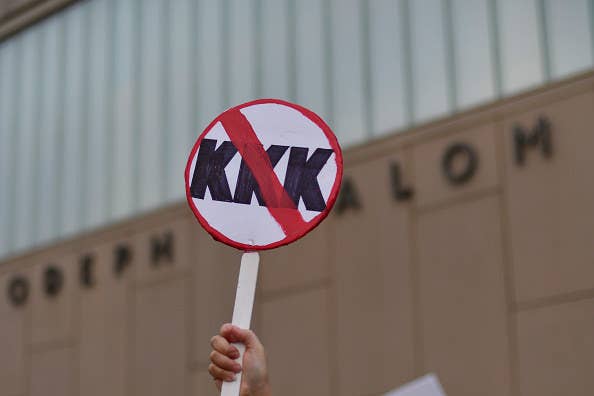
The Ku Klux Klan appears to be losing out to the more loosely organized, and more online savvy, alt-right movement, researchers said in a new report released Wednesday.
The "Year in Hate and Extremism" report by the Southern Poverty Law Center (SPLC) found that the number of KKK groups decreased from 130 to 72 last year. Over the same period, the number of neo-Nazi groups grew from 99 to 121, an increase of 22%, researchers found.
The moment was crystalized at the Unite the Right rally in Charlottesville, Virginia, in August, where a broad swath of the far right gathered to oppose the removal of a statue of Robert E. Lee. One counterprotester was killed and dozens of others were injured in the ensuing clash.
"Klansmen showed up at Charlottesville and tried to glom on to the hipper part of the movement," Heidi Beirich, director of the SPLC's Intelligence Project, said. "The alt-right is where the action is right now."
Overall, the SPLC found that the number of domestic hate groups increased by 4% from 2016 to 2017, from 917 to 954. Still, Beirich said it's difficult to estimate what that means in terms of active members because hate groups either hide or exaggerate their membership, making it nearly impossible to get an objective count.

The SPLC defines a hate group as "an organization that — based on its official statements or principles, the statements of its leaders, or its activities — has beliefs or practices that attack or malign an entire class of people, typically for their immutable characteristics."
Members of hate groups designated by the SPLC may pay membership fees, attend rallies, or otherwise identify themselves to one another. The SPLC counts chapters of larger organizations, like the KKK, as separate hate groups in order to show geographic reach, Beirich said.
The report found that the number of black nationalist hate groups in the US, including the Nation of Islam, grew by 20%, from 193 groups in 2016 to 233 in 2017. Compared to more than 600 white supremacist groups across the country, researchers wrote, that growth rate is small.
"The rise was driven in part by a backlash from the Nation of Islam and other fringe black nationalist groups that see Trump as an avatar of the rising white supremacist movement," researchers wrote.
Black nationalist hate groups, according to the SPLC, promote conspiracy theories and use "anti-Semitic, anti-LGBT, and anti-white rhetoric." Black Lives Matter, the researchers pointed out, is not one of those groups.
A key difference between black and white nationalist groups, however, is that the former have little power.
"They are not organizations that have people in administrative appointments," Beirich said. "They have very little impact on mainstream politics."
The SPLC also added two "men's supremacy" groups — Return of Kings and A Voice for Men — to its list of hate groups. Over the past year and a half, Beirich said, the two groups have migrated from the largely online world of so-called men's rights forums and blogs to having in-person meetings.
The two groups, Beirich said, "demonize women as an entire population. They use slurs like 'they’re whores, bitches, they’re destroying all men.' They're trying to make women look like a lesser form of humanity. Their rhetoric is no different from the other hate groups we track."
SPLC researchers did offer a caveat with the report: More and more extremists are operating alone, particularly young white supremacists.
"The overall number of hate groups likely understates the real level of hate in America, because a growing number of extremists, particularly those who identify with the alt-right, operate mainly online and may not be formally affiliated with a hate group," researchers wrote.
